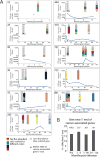Decade-long safety and function of retroviral-modified chimeric antigen receptor T cells
- PMID: 22553251
- PMCID: PMC4368443
- DOI: 10.1126/scitranslmed.3003761
Decade-long safety and function of retroviral-modified chimeric antigen receptor T cells
Abstract
The success of adoptive T cell gene transfer for treatment of cancer and HIV is predicated on generating a response that is both durable and safe. We report long-term results from three clinical trials to evaluate gammaretroviral vector-engineered T cells for HIV. The vector encoded a chimeric antigen receptor (CAR) composed of CD4 linked to the CD3ζ signaling chain (CD4ζ). CAR T cells were detected in 98% of samples tested for at least 11 years after infusion at frequencies that exceeded average T cell levels after most vaccine approaches. The CD4ζ transgene retained expression and function. There was no evidence of vector-induced immortalization of cells; integration site distributions showed no evidence of persistent clonal expansion or enrichment for integration sites near genes implicated in growth control or transformation. The CD4ζ T cells had stable levels of engraftment, with decay half-lives that exceeded 16 years, in marked contrast to previous trials testing engineered T cells. These findings indicate that host immunosuppression before T cell transfer is not required to achieve long-term persistence of gene-modified T cells. Further, our results emphasize the safety of T cells modified by retroviral gene transfer in clinical application, as measured in >500 patient-years of follow-up. Thus, previous safety issues with integrating viral vectors are hematopoietic stem cell or transgene intrinsic, and not a general feature of retroviral vectors. Engineered T cells are a promising form of synthetic biology for long-term delivery of protein-based therapeutics. These results provide a framework to guide the therapy of a wide spectrum of human diseases.
Conflict of interest statement
Figures



Comment in
-
Safety and stability of retrovirally transduced chimeric antigen receptor T cells.Immunotherapy. 2012 Sep;4(9):899-902. doi: 10.2217/imt.12.91. Immunotherapy. 2012. PMID: 23046233
References
-
- Cavazzana-Calvo M, Payen E, Negre O, Wang G, Hehir K, Fusil F, Down J, Denaro M, Brady T, Westerman K, Cavallesco R, Gillet-Legrand B, Caccavelli L, Sgarra R, Maouche-Chretien L, Bernaudin F, Girot R, Dorazio R, Mulder GJ, Polack A, Bank A, Soulier J, Larghero J, Kabbara N, Dalle B, Gourmel B, Socie G, Chretien S, Cartier N, Aubourg P, Fischer A, Cornetta K, Galacteros F, Beuzard Y, Gluckman E, Bushman F, Hacein-Bey-Abina S, Leboulch P. Transfusion independence and HMGA2 activation after gene therapy of human beta-thalassaemia. Nature. 2010;467:318. - PMC - PubMed
-
- Hacein-Bey-Abina S, Garrigue A, Wang GP, Soulier J, Lim A, Morillon E, Clappier E, Caccavelli L, Delabesse E, Beldjord K, Asnafi V, Macintyre E, Dal CL, Radford I, Brousse N, Sigaux F, Moshous D, Hauer J, Borkhardt A, Belohradsky BH, Wintergerst U, Velez MC, Leiva L, Sorensen R, Wulffraat N, Blanche S, Bushman FD, Fischer A, Cavazzana-Calvo M. Insertional oncogenesis in 4 patients after retrovirus-mediated gene therapy of SCID-X1. J Clin Invest. 2008;118:3132. - PMC - PubMed
-
- Aiuti A, Slavin S, Aker M, Ficara F, Deola S, Mortellaro A, Morecki S, Andolfi G, Tabucchi A, Carlucci F, Marinello E, Cattaneo F, Vai S, Servida P, Miniero R, Roncarolo MG, Bordignon C. Correction of ADA-SCID by stem cell gene therapy combined with nonmyeloablative conditioning. Science. 2002;296:2410. - PubMed
-
- Muul LM, Tuschong LM, Soenen SL, Jagadeesh GJ, Ramsey WJ, Long Z, Carter CS, Garabedian EK, Alleyne M, Brown M, Bernstein W, Schurman SH, Fleisher TA, Leitman SF, Dunbar CE, Blaese RM, Candotti F. Persistence and expression of the adenosine deaminase gene for 12 years and immune reaction to gene transfer components: long-term results of the first clinical gene therapy trial. Blood. 2003;101:2563. - PubMed
-
- Heslop HE, Slobod KS, Pule MA, Hale GA, Rousseau A, Smith CA, Bollard CM, Liu H, Wu MF, Rochester RJ, Amrolia PJ, Hurwitz JL, Brenner MK, Rooney CM. Long-term outcome of EBV-specific T-cell infusions to prevent or treat EBV-related lymphoproliferative disease in transplant recipients. Blood. 2010;115:925. - PMC - PubMed
Publication types
MeSH terms
Substances
Grants and funding
LinkOut - more resources
Full Text Sources
Other Literature Sources
Research Materials

